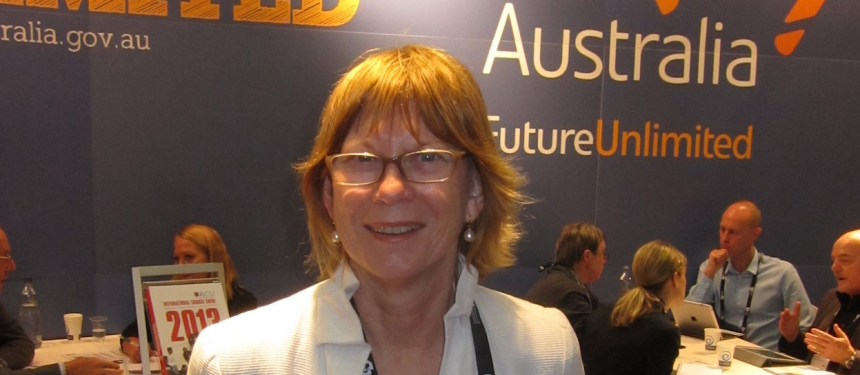HZ: Yes, apart from our TNE ventures. We have been fortunate to expand our delivery of the Adult Migrant Education Program in NSW to around 94% of clients. We are also in consortium with AMES Victoria to deliver the national distance/e-learning AMEP program. We are really the only significant private provider in this sector.
News and business analysis for Professionals in International Education
Have some pie!
Helen Zimmerman, Executive General Manager, Navitas English

The PIE: Australia has had a tough few years. Do you see that as being on the turn now?
HZ: They are certainly committed to doing something about it. As are the peak and professional bodies. We’ve managed to come together and have been taking a position with government for quite a number of years now about needing a whole-of-government approach that supports and celebrates the benefits of international education.
“We had a debate about a small Australia or a big Australia and it sent messages that Australia wasn’t welcoming”
The PIE: Was that what was missing?
I think that desire was always there and then the downturn hit, but I think at the same time the paradigm changed completely. All of the things that we’re hearing about now are really about the impact of globalisation and the fact that we are so connected, and needing to look at a much more mutually beneficial relationship with learners and their source countries.
The changes on the visa regime were so sudden, really, and so extreme that it created problems. We had an election, we had a debate about a small Australia or a big Australia and it sent messages that Australia wasn’t welcoming. I think all of those things contributed negatively, together, with issues of safety and security for students.
The PIE: But the visa problem had to be addressed because of Australia’s record numbers, don’t you think?
HZ: Absolutely. The rogue practice was never quantified in a way and the media coverage was only focused on the negatives so people thought it was rampant, but it wasn’t. My assessment is that probably less than 5% of the industry was affected by bogus school closures. The majority of providers were very high quality and continuously received high student satisfaction ratings.
The PIE: What are your thoughts on the Chaney report?
HZ: I fully endorse the 35 recommendations and seven themes contained in the report but I’m just concerned with resourcing. The fact that the proposed Ministerial Coordinating Council for International Education (MCCIE) will only meet twice a year will be insufficient to ensure active engagement by stakeholders and implementation by governments. There was also hope that a five-year strategy would be forthcoming, but this has now been pushed back into the council’s proposed work plan.
“I endorse the recommendations and themes in the Chaney report but I’m concerned with resourcing”
The PIE: It still seems quite innovative that the Australian government backed the task force with business involved to write the report.
HZ: Yes, it’s great. I believe education is our most important industry. Unlike mining, knowledge is a renewable energy. We are good at delivering quality outcomes, not just at making money. However we need to adapt to changed demand and ensure students feel more welcome in Australia. Since 2009/10 export earnings have fallen by over 3 billion dollars. That’s people’s jobs, not only in the industry but in the support services around it, in the local communities.
The PIE: What is the average Australian’s understanding of the industry?
HZ: I think that we have not engaged well with Australian communities about the benefits of international education and international students to Australia and our place in the world. The importance of the industry is better understood in rural and regional communities where international students are welcomed for the diversity they bring as well as contributing to local tourism and service businesses.
We need to do a better job in the big cities and counter the myths that are around, for example that international students take places from domestic students. There is a big ‘hearts and minds’ engagement strategy that’s needed.
Still looking? Find by category:



4 Responses to Helen Zimmerman, Executive General Manager, Navitas English